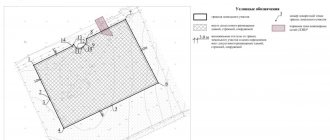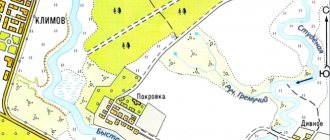We prepare permits for construction: we obtain GPZU, SPOZU, conduct geoengineering surveys and formulate a project.
An urban planning plan for a land plot (GPZU) must be obtained for the construction of any real estate property. Based on the information specified in it, a construction project is developed, a construction permit is obtained and the commissioning of a new facility is formalized. They draw up a plan in accordance with the development and land use rules (DZR) in force in the municipality, urban planning regulations and the General Plan. You can use the GPZU for 3 years after registration; at the end of this period, a new document is drawn up. Information about whether changes can be made to the current urban development plan, and when this is necessary, is useful for every developer.
GPZU. Title page
GPZU. Building spot
What does a town plan look like?
An urban development plan is drawn up for areas that have already been built up or are subject to development. The information it contains is needed to create a project for a future structure and approve a construction permit. They draw up GPZU based on the PZZ of a specific territory, urban planning regulations, and documentation on its planning. The document states:
- coordinates of the site and cadastral number (if available);
- location of the future building;
- permissible distance from the boundary;
- permitted type of use;
- requirements for the construction site;
- technical conditions for connection to utility networks;
- restrictions on the use of the site: public easements, red lines, etc.
When registering a GPZU at the request of the owner of the site, cadastral engineers and lawyers of our company carefully check the specified information for compliance with legal requirements and, if necessary, make changes to it.
Amendments to the urban development plan
The existing plan is adjusted if local documents have changed: PZZ, urban planning regulations, General Plan, or the owner of the plot himself has decided to use his own plot for a different purpose.
Changing the VRI of a section
For each category of land, the PZZ defines the types of permitted use of the site itself and the capital structures located on it. They are divided into: basic (housing construction or personal farming), conditionally permitted (for example, gardening) and auxiliary (for example, law enforcement). The type of permitted use can be changed either at the initiative of local authorities or at the suggestion of the owner of the site. He has the right to come up with such an initiative on the basis of clause 5, part 3, art. 33 of the Town Planning Code, if according to the current PZZ:
- the site is used inefficiently;
- the owner is harmed;
- The legitimate interests and rights of citizens are not realized.
The owner has the right to change the main and auxiliary types without additional approval from local authorities in accordance with Part 4 of Art. 37 Civil Code of the Russian Federation. In other cases, the application is considered at public hearings, based on the results of which the commission makes an appropriate decision. If the type of use is changed, this fact must be reflected in the GPZU.
Our company’s lawyers, at the request of the owner of the site, can assist in changing this parameter, if necessary, represent his interests at public hearings and prepare an adjusted GPZU.
Change of PZZ
Development and land use rules may change at the initiative of the local administration. This may involve the identification, removal or relocation of red lines, or the establishment or termination of easements. If these actions affect a specific land plot, then its urban planning plan needs to be redone. However, if a building permit has been received and its period has not expired, the owner can begin construction.
If the owner decides, in addition to a residential building, to build another capital facility on the site or to move the planned structure to another location, these amendments must be made to the GPZU. Cadastral engineers will help you obtain the GPZU and, if necessary, make amendments to it. We also coordinate the encumbrances specified in the plan and issue a construction permit.
Video on the topic
GPZU decoding and definition GPZU defines four main parameters of a land plot
The procedure for issuing GPZU in Moscow
Reasons for refusal to issue an Urban Development Plan for a land plot
Challenge the decision of the State Land Committee in court
An urban planning plan for a land plot (GPZU) is a document of the form established by the Ministry of Regional Development of the Russian Federation (Order of the Ministry of Regional Development of the Russian Federation dated May 10, 2011 N 207 “On approval of the form of an urban planning plan for a land plot”), which defines the boundaries and urban planning requirements for use and development land plot. GPZU is essentially a document that provides the developer with information about the main types of permitted use of the land plot, indicating information about the maximum parameters for the development of the land plot, the height of the object and the percentage of development of the land plot (Clause 2 of Article 4 of the Federal Law “On the Enforcement of the Town Planning Code Russian Federation" (hereinafter referred to as the Civil Code of the Russian Federation) N 191-FZ dated December 29, 2004).
The development of GPZU is carried out for each specific land plot and serves as a document defining the functional purpose, number of floors and other maximum permitted parameters of the construction (reconstruction) project.
Preparation of GPZU for a land plot is carried out:
- as part of a territory surveying project,
- as a separate document.
Urban planning plan of the land plot
for investors-developers it is needed in three cases:
- firstly, in order to submit project documentation for examination;
- secondly, to obtain a building permit;
- thirdly, to obtain permission to put the facility into operation.
That is, by virtue of the provisions of Art. Articles 48 and 51 of the Civil Code of the Russian Federation, it is necessary for the investor-tenant at all stages of the “construction life” of the object - without the GPZU, neither architectural and construction design, nor the construction itself, nor the commissioning of the constructed facility is carried out. Subsequently, the GPZU is also required - without it, neither reconstruction nor even major repairs of a previously constructed facility can be carried out.
GPZU defines four main urban planning parameters of a land plot and buildings:
- functional purpose of the land plot: indicates the main type of permitted use of the land plot;
- building density of a land plot (sq.m./ha): indicates how many sq.m. real estate can be located on the site, including existing buildings and structures, plus new construction;
- maximum elevation (meters): shows no more than what height an object can be located on a given land plot.
- development of the land plot (%): what percentage of the land plot area can be built up with permanent buildings.
In accordance with Part 3 of Art. 44 of the Town Planning Code of the Russian Federation dated December 29, 2004 No. 191-FZ, as part of the town planning plan of a land plot the following is indicated:
- land plot;
- boundaries of public easement areas;
- minimum setbacks from the boundaries of the land plot in order to determine the places of permissible placement of buildings, structures, structures, outside of which the construction of buildings, structures, structures is prohibited;
- information about town planning regulations (if the land plot is subject to town planning regulations). At the same time, the GPZU, with the exception of cases of provision of a land plot for state or municipal needs, must contain information about all types of permitted use of the land plot provided for by the town planning regulations;
- information on the permitted use of the land plot, requirements for the purpose, parameters for the placement of a capital construction project on the specified land plot (in cases where the land plot is not subject to urban planning regulations or urban planning regulations are not established for the land plot);
- information about capital construction projects and cultural heritage sites located within the boundaries of the land plot;
- information on technical conditions for connecting capital construction projects to engineering support networks (hereinafter referred to as technical conditions);
- boundaries of the zone of planned placement of capital construction projects for state or municipal needs.
The GPZU may include information about the possibility or impossibility of dividing it into several land plots.
According to the law, the issuance of GPZU is free for the applicant.
In accordance with the requirements of the Civil Code of the Russian Federation, Moscow, from September 2, 2008, began to develop and issue urban planning plans for land plots.
According to Art. 51 of the Civil Code of the Russian Federation, in order to obtain a construction permit (except for special cases specified in this article), the developer is obliged to submit a town planning plan for the land plot to the authorized body. This document is also necessary for design (Article 48 of the Civil Code of the Russian Federation).
The previously valid Decree of the Moscow Government dated May 25, 2011 No. 229-PP “On the Procedure for the Preparation, Approval and Issuance of Urban Development Plans for Land Plots” is now called “On the Procedure for the Preparation, Approval, Amendment and Cancellation of Urban Development Plans for Land Plots”. Accordingly, a new Administrative Regulation for the provision of government services in the city of Moscow has appeared (hereinafter referred to as the Regulation).
The contents of the GPZU are exhaustively established by Art. 44 of the Civil Code of the Russian Federation - it contains (according to a strictly defined list) information about the land plot itself and about the restrictions on its use established for the issuance of the GPZU, including the purpose and parameters of objects permitted for construction on it, and, as follows from the federal urban planning legislation, this information must be entered into the GPZU from the Land Use and Development Rules, approved in the prescribed manner by the representative authority (in Moscow this is the Moscow City Duma).
This rule was not introduced by the federal legislator by accident - it was supposed to limit to a certain extent the arbitrariness of officials, depriving them of the ability, at their own discretion, to introduce and change the fundamental conditions for the development of land plots at any time. Thanks to this norm, investors and tenants of state and municipal lands had the opportunity to reasonably foresee the consequences of their economic decisions.
It is clear that at the same time, the corruption income of an entire layer of land and construction officials was greatly reduced, deprived of the opportunity to blackmail investors and extort multimillion-dollar bribes.
The procedure for issuing GPZU in Moscow
In Moscow, according to Art. 63 of the Civil Code of the Russian Federation, the issuance of GPZU for a land plot falls within the competence of the state authorities of this subject of the Russian Federation. According to the urban planning legislation of Moscow, these functions are vested in the Moscow Government and its authorized body - the Committee on Architecture and Urban Planning of the City of Moscow (Moskomarkhitektura).
In pursuance of the requirements of the Moscow Government Decree of November 16, 2010 No. 1019-PP “On the creation of the Urban Planning and Land Commission of the City of Moscow,” all GPZU began to be considered by this commission, in connection with which many investors, developers, rights holders of land plots and real estate objects faced with serious difficulties and problems associated with the release of this document. This especially affected those investors who are not professionals in the field of urban planning, and who, due to necessity, had to deal with the development of this documentation.
The GPZU, by its legal nature, is neither a legal document nor a legal document (which is constantly emphasized by arbitration courts). GPZU as an integral part of the territory planning documentation is defined by the Civil Code of the Russian Federation as a kind of certificate - a set of information about the land plot and about legally established permits and restrictions in force on the date of its issuance. As arbitration courts consistently point out (see, for example, Resolutions of the Federal Antimonopoly Service of the Moscow Region dated August 2, 2011 No. KA-A40/7882-11 in case No. A40-120650/10-72-482, dated November 29, 2011 in case No. A40 -137277/10-111-914, dated November 29, 2011, Resolution 9AAS No. 09AP-28868/2011-AK in case No. A40-84453/11-121-708, dated November 1, 2011 No. 09AP-26034/ 2011 in case No. A40-62729/11-121-508, left unchanged by the cassation instance), by virtue of the federal law, the GPZU does not have the status of a title-establishing or title-confirming document and, in its content, is also not such, but is a purely reference document that can be made in relation to any land plot registered in the cadastral register - both intended for construction and already built up. Such a “reference” document must in any case be issued by the authorized body to the applicant who has provided the appropriate documents within 30 days from the date of application, and without charging a fee (Part 17, Article 46 of the Civil Code of the Russian Federation). The corresponding wording of the reasoning part of judicial acts of arbitration courts of three instances in Moscow for 2011-2012. has clearly acquired the character of a cliché.
Accordingly, an investor’s appeal to the Moscow Committee for Architecture and Urban Development for the issuance of a GPZU only means that the authorized bodies of the Moscow Government, having checked whether the applicant has provided all the documents confirming his right to receive a GPZU, are only obliged to consolidate into this single document all the information about the previously legally established restrictions and permits for the use of land, which, according to Art. 44 of the Civil Code of the Russian Federation and Order of the Ministry of Regional Development of Russia dated May 10, 2011 No. 207, which approved the form of the GPZU, constitute its content.
Clause 17 art. 46 of the Civil Code of the Russian Federation establishes that if an individual or legal entity applies for the issuance of a GPZU, then the relevant body, within 30 days from the date of receipt of the application, prepares an urban plan for the land plot, approves it and provides it to the applicant without charging a fee. Meanwhile, clause 14 of the Regulations introduces a procedure for “suspension of the provision of public services” not provided for by federal legislation. Moreover, if the regulations in the previous edition, in force in Moscow since May 2011, established an exhaustive list of formal grounds for such suspension - the need to hold public hearings (clause 2.16.1) or contradictions in the documents submitted by the applicant (clause 2.16 .2), then now such a basis is simply “sending a draft urban development plan for a land plot for consideration to the Urban Planning and Land Commission of the City of Moscow” (clause 2.14.1 of the new Regulations). In this case, “suspension” is allowed for up to 60 days. Considering that clause 3.9 of the new Regulations directly obliges the Moscow Architectural Committee to send all GPZU projects “for consideration” to the State Land Committee, this means that Moscow officials illegally turned the 30-day period for issuing GPZUs established by the Civil Planning Committee of the Russian Federation into at least 90 days, i.e. That is, tripled.
The general meaning of the norms of the Civil Code of the Russian Federation, which determine the nature and procedure for the preparation and issuance of GPZU, is as follows: the responsibility of the authorities and self-government of public entities is to ensure cadastral registration of all land plots within the appropriate boundaries, to establish for each of them specific mandatory restrictions and permits of an urban planning nature (in particular, on the purpose, parameters and location of a capital construction project, reconstruction), ensuring the openness of relevant information for all interested parties so that citizens and legal entities have the opportunity to reasonably make decisions on the implementation of their economic (in including construction) activities in such areas.
The difficulties in issuing the GPZU lie in the fact that, in accordance with the requirements of town planning legislation, information in the GPZU about the town planning regulations necessary to fill out the sections of the GPZU must be established by the Land Use and Development Rules or documentation on the planning of the territory, or by the land surveying project, and in their absence - by Temporary Regulations.
Town planning regulations, in turn, are defined (Part 9 of Article 1 of the Civil Code of the Russian Federation) as types of permitted use of land plots established within the boundaries of the corresponding territorial zone..., maximum sizes of land plots and maximum parameters of permitted construction, reconstruction of capital construction projects, as well as restrictions on the use of land plots and capital construction projects. These regulations (Part 8 of Article 1 of the Civil Code of the Russian Federation) are established in the rules of land use and development and, in essence, are their integral part. And the rules of land use and development (LZZ), related to urban zoning documents, are adopted and amended by the representative body of local government (according to Article 163 of the Civil Code of the Russian Federation, in Moscow these powers are vested in the Moscow City Duma) based on the results of public hearings (Articles 31-33 of the Civil Code of the Russian Federation RF).
There are still no rules for land use and development in the city of Moscow. According to various sources, only 30% of the entire city territory is provided with documentation for territory planning and land surveying projects. There are no time regulations either.
In a huge number of cities and towns in the country, PZZs have long been adopted and are in effect, significantly contributing to both the interests of local residents and increasing the level of legal protection of investments. An exception to the general rule is Moscow - the only one of the million-plus cities in which PZZs have not yet been installed. The draft law “On the rules of land use and development of the city of Moscow” passed only the first reading in the Moscow City Duma (in December 2009), and in connection with the revision by the new mayor of the capital of the urban planning priorities of the city authorities and the formation of “greater Moscow”, the prospects for its adoption are becoming increasingly vague .
In the absence of full-fledged Land Use and Development Rules, the City Commission on Urban Planning, Land Use and Development under the Moscow Government, headed by the former first deputy mayor of Moscow in the Moscow Government V. Resin, en masse independently made decisions on issuing GPZU “based on” or “taking into account “The draft of these Rules never became law, and the Moskomarkhitektura drafted them and issued them to developers.
This commission operated until March 2011, after which its functions were transferred to the newly created Urban Planning and Land Commission of the city of Moscow, headed directly by the Mayor of Moscow S. Sobyanin, who gave it the authority to “approval of draft urban planning plans for land plots prepared on the basis of applications from individuals and legal entities, before the entry into force of the Rules for Land Use and Development in the City of Moscow.”
Unfortunately, all these GPZUs - both “Resinsky” and “Sobyaninsky” - were issued in violation of legal requirements and therefore did not create a reliable legal basis for construction and, accordingly, for the protection of investments.
Accordingly, no town planning regulations have been established on the territory of Moscow, and all GPZU issued in Moscow relate to the case regulated by paragraphs. 5 hours 3 tbsp. 44 of the Civil Code of the Russian Federation - for land plots for which town planning regulations have not been established.
In this case, as already noted, GPZU should be issued on the basis of urban planning zoning documents previously adopted in the established manner and documents on territory planning other than GPZU. The latter in Moscow included, in particular, acts of permitted use (ARI) and urban planning justifications. Information about the permitted use of a land plot, including in many cases the main parameters of the future facility, is also contained in lease agreements.
Accordingly, in order to approve the GPZU containing information other than that contained in the specified documents, it is necessary, at a minimum, to cancel the previously adopted urban planning decisions on the basis of which these documents were approved and make other decisions. Otherwise, such a GPZU will not comply with the requirements of the Civil Code of the Russian Federation and its issuance (with the appropriate content) can be successfully challenged in accordance with Ch. 24 Arbitration Procedure Code of the Russian Federation.
In addition, the situation for developers and owners of real estate is further complicated by the fact that in the General Plan of the City of Moscow (came into force on June 14, 2010), about 70% of the territory of Moscow fell into development zones - reorganization areas. This means that the issuance of GPZU for land plots that fall into these zones is possible only after the development of territory planning documentation for these territories. And the rest of the territory, according to the General Plan of the city of Moscow, is a stabilization zone in which most of the territory belongs to preserved residential development. The requirements for the development of land plots and capital construction projects indicate that land plots are developed to ensure the rights and interests of legal holders of land plots and capital construction projects by providing them with “the opportunity to choose the most effective types of permitted use of land plots.”
As practice shows, since the consideration of the GPZU by the Urban Planning and Land Commission of the city of Moscow, a rare owner of a land plot has managed to obtain a GPZU, which would allow him to fully realize his rights and intentions to create real estate.
Reasons for refusal to issue an Urban Development Plan for a land plot:
1. The applicant may be refused acceptance of an application for the preparation of the State Property Fund if an incomplete set of documents is submitted or inconsistencies are detected in the documents submitted by the applicant. If admission is refused, the applicant is issued a Refusal Notification Card.
2. The Moscow Committee for Architecture refuses to issue the GPZU to the applicant in the following cases: • it is established that the documents submitted by the applicant do not comply with the requirements established by law; • identifying circumstances previously unknown when accepting documents (including when a notarized copy of the cadastral plan (passport) of a land plot on paper does not correspond to the cadastral plan (passport) of a land plot on electronic media, etc. reasons); • when the applicant submits incorrectly executed or invalid documents.
3. The refusal to issue a GPZU is formalized by a motivated letter from the Moscow Committee for Architecture, sent to the applicant with the return of the documents submitted by the applicant.
4. If it is possible to finalize the submitted documents, the preparation of the GPZU may be suspended until the applicant provides the necessary documents to the Moscow Committee for Architecture, of which the applicant is notified by a corresponding letter.
The situation began to deteriorate radically in 2011. The PZZ was never submitted for the second reading (this should have happened in the first quarter of 2011), and in June, Moscow Law No. 27 Art. 43 of the Moscow Urban Planning Code, the reference to land use and development rules as the basis of the GPZU was simply excluded. In November, through the efforts of the then Chairman of the State Duma Committee on Land Relations and Construction M. Shakkum, Federal Law No. 427-FZ dated December 12, 2011, which was made specifically for the executive authorities of Moscow and St. Petersburg, was “dragged through” with incredible speed (in just 6 days!) exceptions from the general norms of land and civil legislation that are completely inexplicable within the framework of constitutional legal logic. The “Shakkum Law” allows the authorities of the “two capitals,” accusing investors and developers of violating construction deadlines (the reason for which, most often, is the sluggishness, incompetence or dishonesty of city officials themselves), to unilaterally terminate investment and lease agreements out of court, arbitrarily the most redistribution of the market. At least 400 such agreements are expected to be terminated in the near future, and their list is kept deeply secret by the capital’s authorities.
Challenge the decision of the State Land Committee in court
The practice of arbitration courts shows that investors have a good chance of challenging decisions of the Urban Planning and Land Commission (ULC) regarding changes to previously approved development parameters, failure to issue a GPZU within 30 days, or the issuance of a GPZU with zero indicators. In the overwhelming majority of cases, the courts recognize the decisions of the State Land Committee as illegitimate and refer officials to the general development plan for Moscow and the draft Land Use and Development Rules (LZZ), approved in the first reading in 2009.
For more than two years of its existence, the State Planning Committee has become the main body deciding the fate of urban planning projects in Moscow. Initially, the creation of the commission was explained by the need to review 1.3 thousand investment contracts concluded by the previous city leadership. Moreover, it was planned to do this before the end of September 2011. However, gradually the officials got the hang of it. At the meetings of the State Land Committee, the following began to be considered: draft territory planning, urban planning regulations and land use regimes, applications for the issuance of state land use rights, parameters of state land use rights issued in 2008-2010, starting conditions of auctions and many other issues that were previously resolved by the relevant departments. In 2012, 3.7 thousand issues were considered at its meetings (in 2011 - 2.9 thousand), construction of 3.3 million square meters was canceled. m of real estate (in 2011 - 8.2 million sq. m).
It is not surprising that many investors, having received a “black mark” from the SLC, went to the courts. And they did the right thing.
The judicial practice of the Moscow Arbitration Court, the 9th Arbitration Court of Appeal and the Federal Arbitration Court of the Moscow District indicates the possibility of challenging the decision of the commission in the presence of previously approved urban planning documentation.
The Commonwealth of Land Lawyers is engaged in supporting disputes of any complexity in the field of land, real estate and investments.
You can find out more about this service at https://zem-advokat.ru/news/judicial-practice-in-cases-of-easement-of-land/. You can get advice from our specialists at +7 (495) 644-47-67. Previous news Next news





